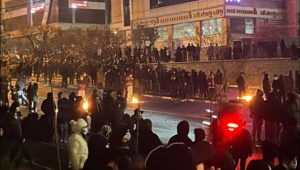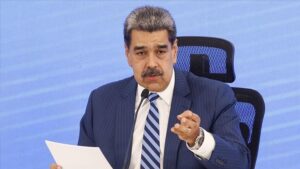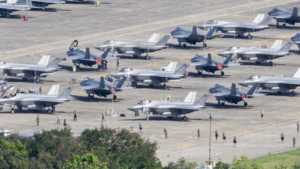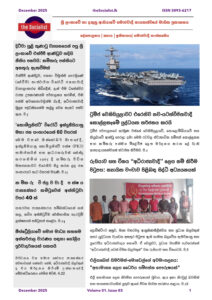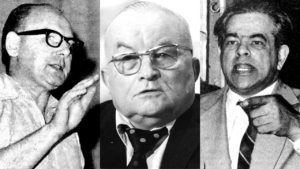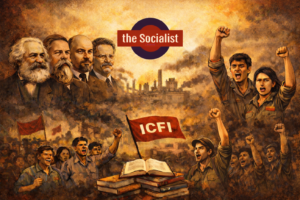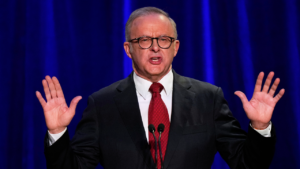Our Correspondent.
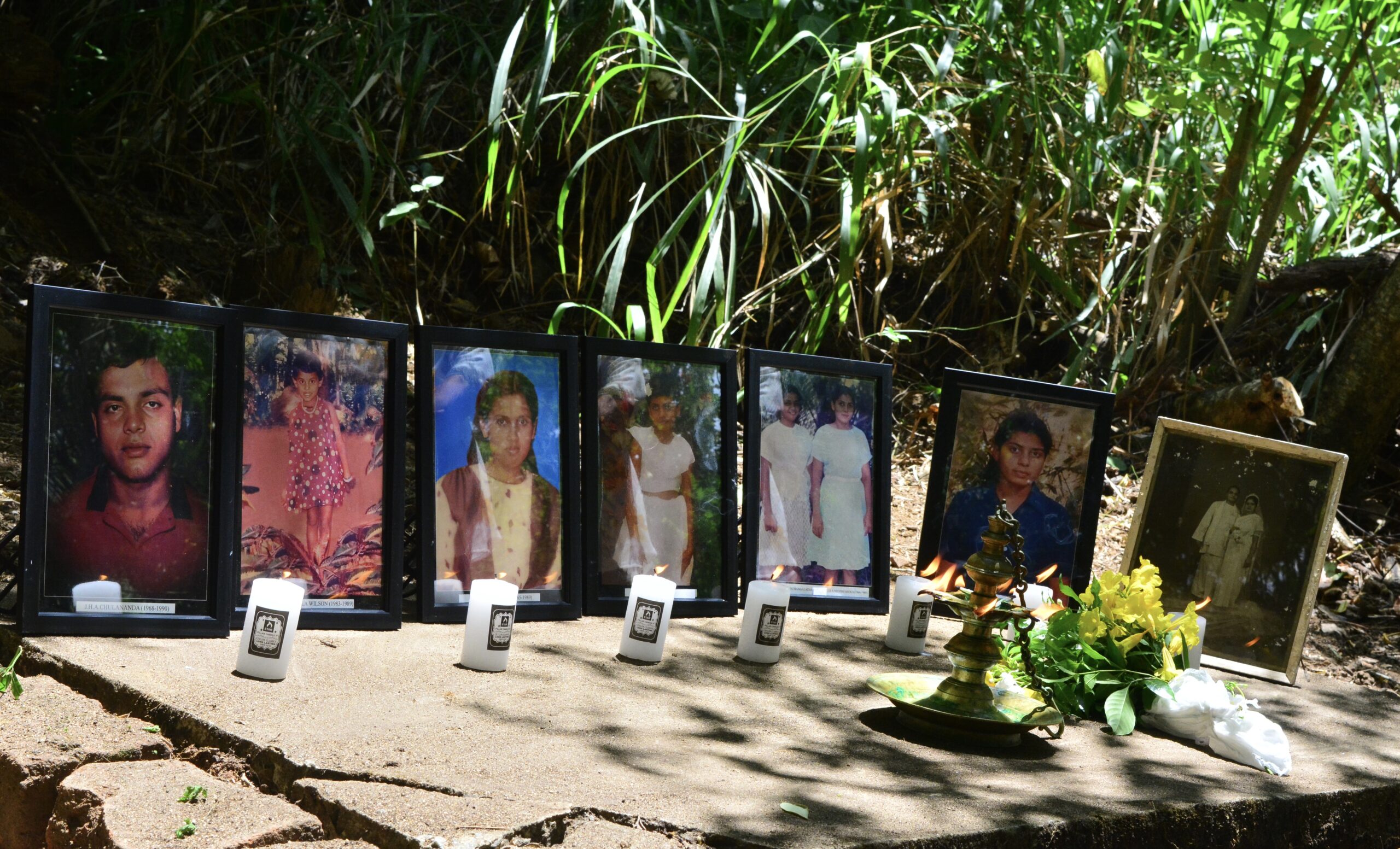
On August 27, at Katuwana, in Hambantota District, the relatives of the seven family members, who were massacred by Sri Lanka Army in August 1989, held an event of commemoration of their loved-ones, at the same location where they were bombed. This was the first time a commemoration event was held in remembrance of these victims of state terror after 36 years of impunity and oppression. theSocialist.lk reporters were present at the occasion.
On that fateful night, three and half a decade plus one year ago, Sri Lanka army of the Singha Regiment – 6th Battalion invaded the house of the family, where the only male who was at home at the time was the 63 year old father, J.H.A. Edwin, a Sinhalaese traditional medical physician. The others were the 53-year-old mother, H.A. Sisiliyana; the three young daughters, namely J.H.A. Nilmini Asoka (25), J.H.A. Mathangalatha (20), J.H.A. Sujithaseeli (15); a niece, W.A. Chandraleka (24), and the 6 year old granddaughter, N.A. Niranjala Wilson. All were ethnic Sinhalese. The army killed them all on the spot or, according to some witnesses—who were also killed later—the four young girls were carried to the army camp, raped for three days and killed. The house was bombed and the family was burnt with the house.
The relatives displayed the pictures of their loved ones and lit candles. Two surviving daughters, their husbands, grandchildren and their families and friends observed minutes of silence. Even decades later, their tears have not dried. Vimukthi, a grandson of Edwin addressed the gathering. He stated as follows:
“This is the first time in 36 years that we have been able to gather here publicly to speak their names…They were silenced by guns and disappeared into the shadows of mass graves and tire pyres.
For 36 long years, we could not hold this historic event in commemoration of their memory. We could not come here, speak their names, and mourn openly. The state of terror, the climate of repression, and the continued threat against those who sought truth and justice kept families like ours silent. But silence is not forgetfulness. These years have only deepened our grief and strengthened our determination.
Today we break that silence… Those who carried them out—from the military, death squads and the police to those who directed them—must be held accountable before history, if not yet before law.
Our relatives’ blood cries out not for revenge, but for truth and justice. It cries out for recognition that these lives mattered, that the poor, the villagers, the youth killed in those years were not expendable.
We carry your names and the memories of cruelties inflicted on you forward as a profound mark of protest, so that such crimes must never be repeated.
May your memory give courage to all who fight for truth, justice and dignity and against State repression.”
He also read out the name of J.H.A. Chulananda (22), the only son of Edwin and Sisiliyana, whom he stated was “a young man who aspired to justice and social equality but was misled by the reactionary political forces of the era”, and who was killed by Beliatta Police in October 1990. He was said to be a member of fascist Janatha Vimukthi Peramuna (JVP) during the 1988-1990 insurgency. When the Army failed to capture or kill him, evidently, the massacre of his entire family was orchestrated as an act of reprisal and terrorization.
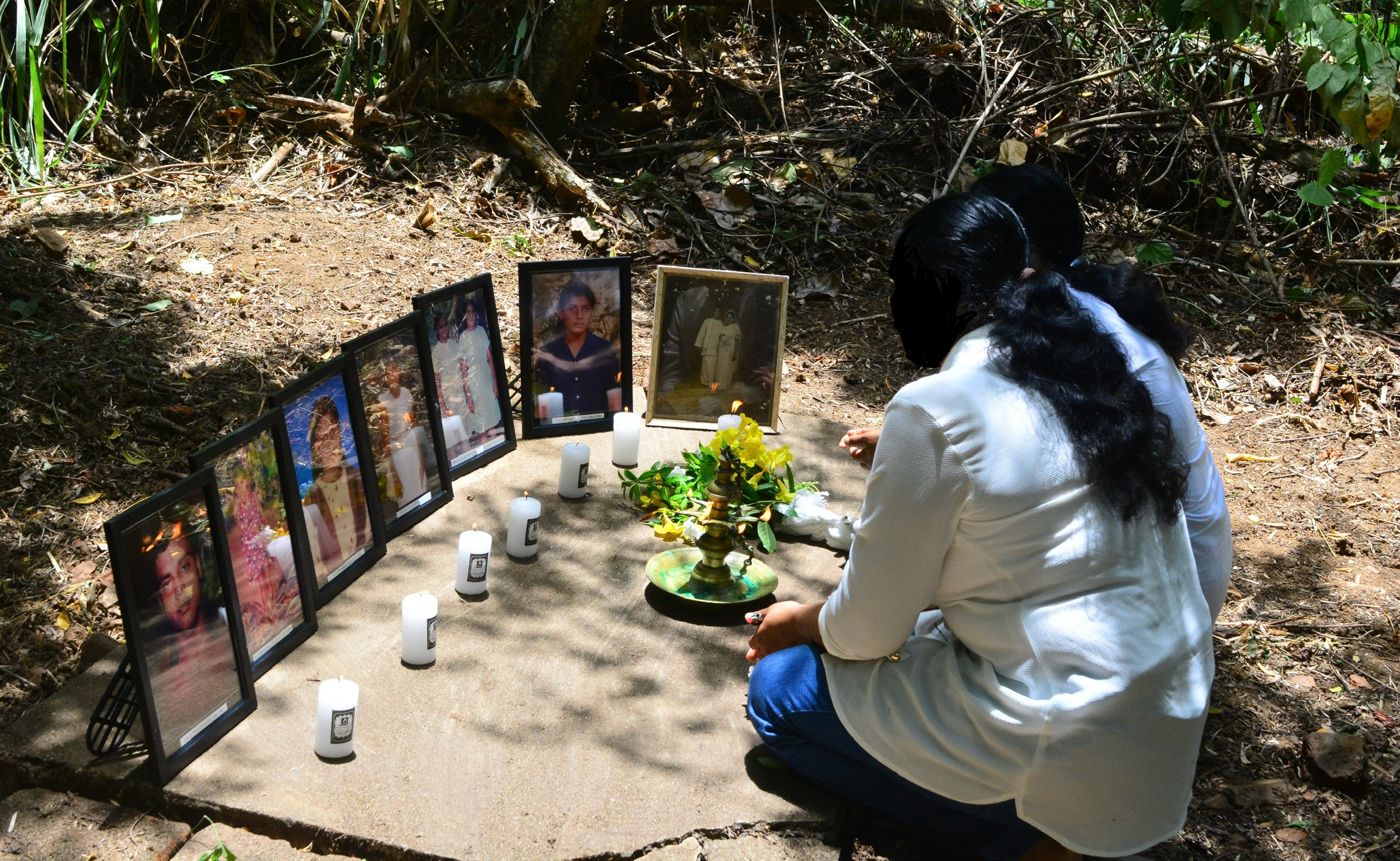
Testimonials
We talked to the victims’ relatives. Edwin’s eldest surviving daughter Chandani (63) related to us her harrowing story of years of pain, endurance and struggle:
“People called my father Weda Mahattaya. He was very much loved by people. He was a very innocent, kind and honest man. He walked slowly, smiled pleasantly, spoke gently, and wore a sarong and the national dress. Formerly, as a monk, he had published a number of Ayurvedic books. Many people who received medicinal treatment from him have met me and told me about the compassionate, and often free, treatment they received from my father and mother.
Our family is a large one of six daughters, and my brother, Chulananda, was the only son. Our family’s economy was founded on meager but stable earnings from my father’s Ayurvedic practice. We had paddy land and acres of coconut, cinnamon and citronella land, which my father cultivated and managed. Due to litigations on land disputes, which my father all won, he lost financially, and his businesses collapsed. We all lived in a thatched house, made of wattle and mud. However, my father could still afford to feed all of us well, educate us, and also help the needy.
By 1971, my father was a strong supporter of the Sri Lanka Freedom Party (SLFP) and Sirimavo Bandaranaike. However, by 1977, he was fed-up with and dissatisfied with the United Front government and voted for the United National Party, whose leader J.R.Jayawardene promised a “Dharmista Samajaya” [A society led by noble principles].
We all went to Katuwana Maha Vidyalaya (school). My brother did not continue his education after grade seven. He was very kind-hearted, sociable, and very helpful to the villagers. He cared for his friends and neighbors more than his own family. He often stayed away from home longer than he stayed at home. He was outstanding, intelligent, fair-looking and, naturally, the youth considered him as their leader. He wanted to do a job, but also never wanted to leave the village. I think he had made connections with the JVP since late 1987.
My brother had earned the wrath of village thugs and father’s former opponents. Once they even attempted to take his life by stabbing him. He narrowly escaped with his life, but his friend succumbed to the injuries.
In 1979, I married a teacher and lived separately. One of my older sisters married a police officer and went to live in Welimada in early 1989. All other sisters were with my parents at home, Loku (Sujithaseeli), the next to youngest preparing for her Ordinary Level Examinations. Hichchi (Mathangalatha) was studying for the Advanced Level (A/L) examination. Neela (Nilmini) was attending vocational training courses after A/L in expectation of a job.
During the school vacation in August 1989, my two elder sisters [Nilmini and Mathangalatha] came to visit us at our residence at Walasmulla [17 km from Katuwana] by bus. Our parental home was just about half a kilometer away from the Army camp located in the Katuwana Govi Jana Seva [Aggrarian Services Center] premises. While my sisters were passing the army camp, some soldiers had shouted and remarked, “well, go, have a round and come”. That was on 26th August, a Saturday.
My sisters had lunch with us. That was our last meal together. All my three children were much fond of staying with their grandparents and aunts. So, all three were crying and pleading to go with their aunts. Finally, my daughter, Niranjala went with them.
On the morning of August 29th, my husband went to Katuwana with a friend to bring our daughter back home, as school vacation was ending. My husband saw the bombed house; he saw burning human flesh and a skull. Nobody was alive, including my child.
After the incident, I went to lodge a complaint at Walsamulla Police, as there was no police station in Katuwana at the time. The police refused to record my complaint. The Officer in Charge (OIC), K.M. Premathilake put his pistol to my mouth and shouted, ‘You woman, keep your mouth shut. Those who take arms will perish by arms.’
Exactly on my 28th birthday, on October 22, 1990, my husband received information from one Silva that my brother had been killed by Beliatta Police. Dasanayake, OIC of the Beliatta Police, who had shot my brother, had quickly informed K. Danapala, the newly elected Provincial Councillor (PC), about the killing. Danapala [who expired a few years ago] feared my brother would pose a threat to his life, which was never the case. My brother’s body had been burnt on a tyre-pyre, after the body was shown to the satisfaction of Danapala.
Danapala too had had a land dispute with my father a long time ago. He lost a court case he had filed against my father. There was also a caste difference between Danapala and us. My father, and almost that entire block of the village, belonged to a higher caste than Danapala’s. Katuwana had a number of such blocks of houses called “Mandi”, where people of different castes lived.”
Chandani’s husband, Chamal (69), related his traumatic experiences as follows:
”On the morning of 29 August, I went with a friend of mine in his car to Katuwana to bring my daughter back home. My friend wanted to meet Danapala Manthree (PC) and request his help to get his nephew released from Walasmulla Army camp. At the road barrier at the Katuwana Army Camp, the army stopped our car. My friend told them we were going to meet Manthree Thuma (Danapala). So, we were allowed to proceed.
When we reached the place where the house was situated, I could not see the house. I could only see the smoke. I went closer. I could not believe my eyes. The house was demolished and everything was burning. I could see human flesh burning inside the house close to the main door. I saw a skull burning. I could not stand up. One or two villagers came to me and held me tight. A sister of my mother-in -law came to me and said, ‘Nobody is alive. Everybody is burnt’. I shouted, calling my daughter’s name. The aunt told me, ‘You should leave now. If the army comes and finds you, they will kill you too”. My friend then pushed me inside the car and brought me back home. I told my wife everything. She was devastated.
A couple of weeks later, Gamini, one of Danapala’s home guards [Grama Arakshaka – members of government’s Civil Security Force], told me that he and another guard were present with the army when they committed the crime, and asked me not to search for the family as everybody was killed by the army. He told me that the four sisters were taken to Katuwana army camp, raped and tortured there for three days, and then killed. It was not long afterwards that I came to know that both those guards were assassinated.
During the same period, we were trying to lodge complaints at police stations and even searched for them at army camps, as we believed they were still alive in some detention center. When my wife and I went to lodge a complaint at Walasmulla Police, we were chased away. I even dared to go to Walasmulla army camp to meet Captain P.L.U. Buddadhasa of the 6th Battalion, Singha Regiment, to find out some information about my relatives. He just told me, ‘Do not search for them. They are all dead. Do some religious observances for them’. When I went to complain to the ASP [Assistant Superintendent of Police] office at Tangalle, ASP Ekanayake warned me, saying, ‘You are a teacher; do not try to search for them. Otherwise, you will lose your own life.’
I was able to lodge a complaint at Middeniya Police only in late September 1994, after Madam Chandrika Kumaratunga was elected President. We were also able to complain to the Presidential Commission on Disappearances. The Muttetuwegama Commission’s final report contains the seven names of our relatives.
However, the court case never proceeded after 1998. We have learned that the Police had colluded with Danapala to systematically bury the case, four years after the collection of samples from the massacre site.
Due to the lasting psychological shock my wife and I had to endure, I could not continue my work as a teacher with sincerity. Therefore, I decided to retire under the Circular No.44/90. Thereafter, the conditions of our family worsened. I had to struggle for sustenance for my family of four children.
Chandrika soon resumed the war with the LTTE [Liberation Tigers of Tamil Eelam]. By 1998, we learned of the crimes committed by the Sri Lankan army against innocent Tamil people in Jaffna. The case of Krishanti Kumaraswamy and her family’s murder at Chemmani shook our souls. Then we realized the extent of the crimes Tamils must have been forced to suffer in the North, sometimes even beyond the crimes committed against our family. Later, Mahinda Rajapaksa continued the war, and his and all succeeding governments praised the mercenaries as ‘Rana Viruvo’ [war heroes]. Throughout, we were silenced.”
He also told us about his experience with the false “human rights” crusaders of the time:
“The orphaned youngest sister of my wife was studying and living with us during that period. Once, in early 1997, I went with her to meet Mahinda Rajapaksa at his Carlton office, seeking his help to find a job for her. My parents had worked for D.A. Rajapaksa and I myself had, as a youth, campaigned for Mahinda’s elections. So, I knew him personally. After waiting a long time to meet him, we forcibly entered his room and informed him of our predicament after the massacre of the family. He shouted at us: ‘Look, these people have worked for the JVP and got themselves killed, and now have come seeking my help to get jobs’. My sister-in-law was crying. She never received a job from him, nor any assistance.”
The other surviving daughter, Indumathi expressed her first hand experience of the wrath the local politician had toward the family:
“Since my father supported the UNP in elections in late 1988 and early 1989, after the general elections, my father went with me to talk to Danapala Manthree. Our parental home was just a few yards away from his residence. He was the uncle of Ananda Kularathna, then UNP cabinet minister from the Mulkirigala seat. We later came to understand that my brother was at that time full time engaged in the activities of the JVP, which had ordered people not to vote at elections [the provincial council election in the Southern Province was held in June 1988]. Danapala seemingly saw his life as threatened by the JVP and its military wing, Deshapremi Janatha Viyaparaya (DJV). However, villagers say my brother never left any room for harm to be inflicted upon anybody in the village, not even on those who envied our family. Danapala ferociously denied any help in finding jobs for me or anyone else in our family. He shouted: ‘There is a terrorist in your house. If it were not for Weda Mahattaya, you and your house would already have been reduced to ashes.’
But, neither my parents nor anybody even dreamt of an impending massacre, because we had not heard of such incidents before.
About two days before the bombing of our home, my elder sister Neela sent me a letter saying that the previous day there had been a bomb blast in the area targeting the army, which had killed several soldiers. My sister wrote that now they felt their lives were also in danger. I think the day she posted that letter was the day she and Hichchi visited my eldest sister at her home in Walasmulla. When she sent that letter, our youngest sister was with me at my house. So, her life was saved.”
Sunitha, the youngest surviving daughter and now a teacher, tearfully recalled her loving parents, her brother, and the harassment by the armed forces:
“My father was a Bodhisattva [a reference to the noble lives of Buddha before enlightenment]. As a skilled physician, sought after by people from different parts of the country, I witnessed how miraculously he saved the lives of many patients who had been brought after snakebites. I also saw how skillfully he cured limb and arm injuries caused by various accidents. My mother was the perfect match for my father. Like a goddess, she was dedicated day and night to treating patients.
Our father had written and published a couple of Veda Grantha [medicinal books]. They were written in verse form. Sarpa Visha Sanharaya I and II [Neutralizing Serpent Venom], Bilindu Roga Sanharaya [Treating Pediatric Illnesses] were very popular, and Manthra Sathakaya [Hundred Mantras] is a book still being sold in bookstores.
He never harmed anybody, not even an insect. I cannot understand how cruel one must be to aim a weapon at such a man of glory and kill him. This world is cursed!
My brother was very handsome. He was always helpful and empathetic toward others. He was a leader to the village youth. Sometimes, village youth even betrayed him, not because of any wrongdoing he committed, but to save themselves when they were arrested for small disputes and fights.
About ten months before the massacre of our family, the chief of the Katuwana Army Camp came to our former house with other soldiers and asked my father to remove all necessary belongings, as they were going to burn our house at 7:00 p.m. that night. My father pleaded with him: “Do not harm us. If my son has done anything wrong, you may punish him.” But they burned our house. The house by the side of Rukmalpitiya Road, where our family was living at the time of the massacre, was built later, about a hundred meters away from the former house on the same road.
I remember, during the period of state terror, the army often intruded into our home and searched everywhere inside. We were always terrorized. They knew very well that my brother was not there, and that only our elderly parents and we girls were present. They questioned us about our brother and even searched for books. Sometimes, they even came in the middle of the night while we were sleeping. Then they would ask us to turn off the lamps (kerosene lamps) and search here and there.”
A systematized killing spree
In both the South and the North, the Sri Lankan ruling elite deployed the full apparatus of the state—the military and police, death squads, the Prevention of Terrorism Act, and Emergency Regulations—to eliminate perceived threats to capitalist rule from the political right and, above all, against the innocent rural poor and the oppressed. Theorizing the causes of large scale disappearances during the period, Asian Human Rights Commission (AHRC) report in December 1997 stated,
“[U]nder the emergency regulations, all restraints on law enforcement officers were removed, and the power to dispose of dead bodies was left to the sole discretion of these officers. Judicial supervision was suspended. There were no provisions even to keep records of the disposed bodies.”
The report further stated as follows:
“Disappearances were the result of a very deliberate policy and were implemented meticulously according to a plan. Law enforcement officers received instructions to arrest, kill and dispose of the bodies. Enacting emergency regulations made this legally possible. The police were constantly coached to carry out killings, and there were methods of supervising how many were to be killed in each area. Incentives were given through the distribution of money for killer squads.
Liquor was also provided to these squads to keep them in a mood conducive to participation in such activities. Lists of those who were to be killed were distributed. Special interrogations were held in special places for interrogation. In many instances, the decision to kill was made during these interrogations, and people were murdered in the secret surroundings of these places. Law enforcement officers mingled with illegal elements in undertaking these activities. Politicians were given direct access to these groups so that they could execute the wishes of these politicians.”
The Commission Report and the Buried Lists
In November 1994, president Kumaratunga appointed three presidential commissions to inquire into incidents of involuntary removals or disappearances of persons after 1 January 1988. The commission chaired by Manouri Muttetuwegama inquired into incidents in Western, Southern and Sabaragamuwa Provinces.
In response to the Commission’s request to provide information on the officers who were attached to the Katuwana Army Camp at the time, on 30 June 1997, the Army replied “not mentioned” in their records—the same answer given in response to most of the other camps. The Commission did not take any further steps to obtain the information from the Army.
The alleged perpetrators of these crimes were shielded by the very recommendations of the Commission itself. While the Commission “found the information and material upon which the allegations of the witnesses were based to be prima facie credible,” it nevertheless stated: “we recommend that the lists of names of persons alleged to have been responsible for involuntary removals or disappearances sent by us under separate cover be not published,” until further investigations were carried out. No such “further investigations” were ever undertaken by Kumaratunga’s government or by successive governments, thereby granting the perpetrators lifelong impunity and protection to commit further crimes. To this day, these confidential lists and the witness testimonies remain undisclosed to the public.
theSocialist.lk has pointed out the class character of the government’s policies of repression during the counterinsurgency in the South, which were later carried forward against the ethnic Tamil population in the North and East, in order to defend the capitalist unitary state and the interests of finance capital.
These atrocities of the capitalist state cannot—and could not—be prevented, nor justice established, without the abolition of the parasitic state, its military, police, laws, and capitalist class rule. This is the historic task of the working class, rallying behind it the petty bourgeoisie and the oppressed masses, as part of the united struggle of the South Asian and international working class for socialist policies.


